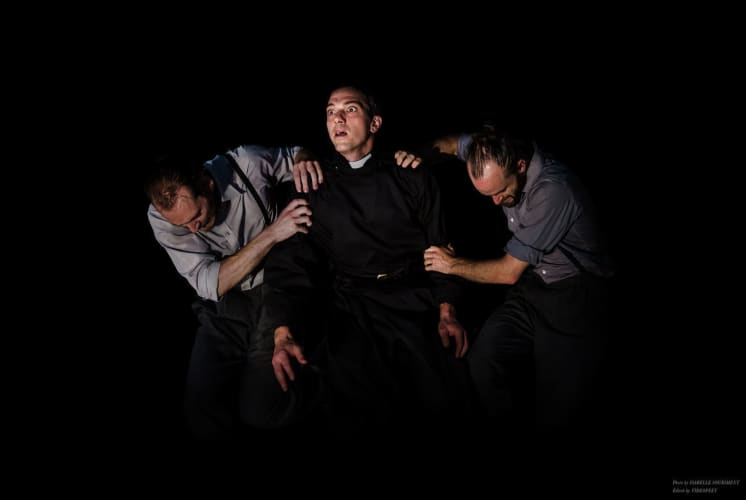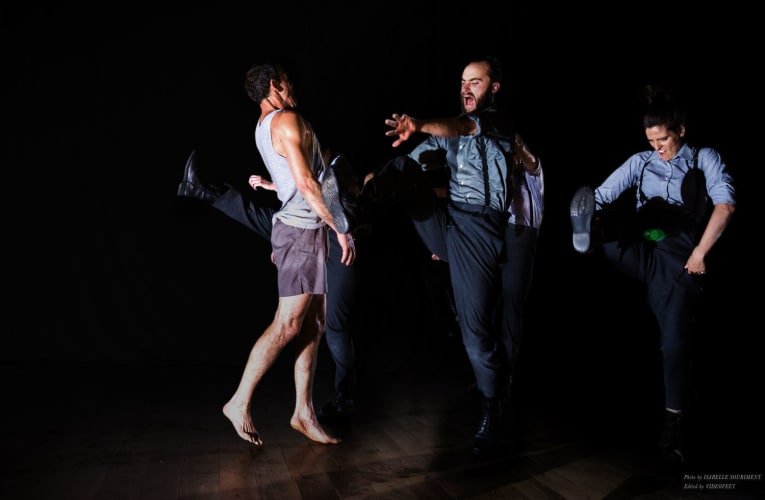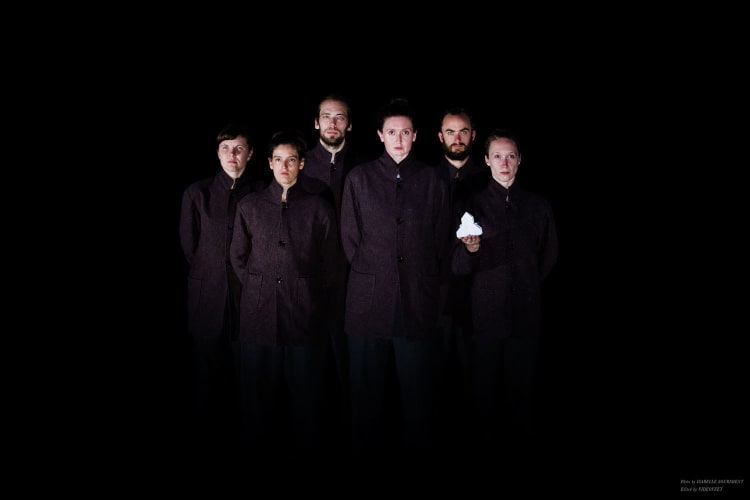Based on a multi-layered, cryptic, allusive and allegorical collection of poetry and prose by Ted Hughes, this physical interpretation by international collective OBRA aims at reproducing an off-kilter world where malevolent spirits mingle with church-going earthlings.
The piece begins with ensemble work, the performers all clad in similar grey shirts and moving in flocks and swoops together round the stage. This sequence, drawing particularly on the poem’s pre-title "Prologue" and "Argument", depicts the nightmarish journey of an Anglican clergyman, Lumb, as he is abducted by spirits from the underworld.
Lumb is replaced by a changeling doppelgänger hewn from a tree, who sets about preaching a new interpretation of the Gospels in which "love thy neighbour" is a literal and physical instruction. The changeling-Lumb sets about impregnating all of the female inhabitants of the small, unnamed town.
The opening forty-five minutes, following the original Lumb as he dashes home through the town only to be led astray and finally flayed and imprisoned by the otherworldly creatures, is effective and sets up an eerie, dream-like atmosphere. The spirits are never seen, only their effects on the bodies they attack and shape, and snatches of Hughes’s text describe streets awash with corpses which seem to rise up and clutch at Lumb as he flees.
OBRA has created a coherent—though necessarily restricted—movement vocabulary for the piece, counterposing jerky leaps, catches and plunges to the floor with measured, controlled, smaller gestures. With the accompaniment in the first section of a musician playing a gamelan-like ensemble of percussive instruments, a mood of eerie, folk-tale menace is well established. The sparse storytelling is shared among the ensemble, staring out like a chorus of wraiths.
After the interval, the dramaturgy shifts distinctly. Performers are individuated through repeated characteristic gestures, backed by pre-recorded audio describing a series of women and their spurned, suspecting husbands. The tone is more worldly, with recognisable Yorkshire accents and identifiable human motivations for the husbands who spy on Lumb as, one by one, he has their wives.
There are echoes, even, of Under Milk Wood, though the Hughes text quoted is more prosaic, less compulsively assonant than Dylan Thomas’s. As we see repeated and episodic snapshots of Lumb on his travels around the town, and women preparing themselves for him, or thrilling after their encounter, the voyeurism of the piece is emphasised by the multiple watchers.
In this section, too, the company has set out a challenge to itself and to the audience: to experience time differently. The repetition and control of long sequences of the work, the even delivery and balanced physicality, create an at times trance-like atmosphere, even in the mundane descriptions of the townsfolk’s lives.
Ultimately, I felt there were flaws, though the commitment and bravura of the physical performances cannot be faulted. The uneven balance of time (with a second half touching two hours), the sense of multiple false endings to the narrative, and—especially—the lulling and oddly inert reliance on pre-recorded voiceover for the second part all add up to a piece which feels somehow under-adapted for stage consumption.
OBRA claims that its aim is to make “theatre rooted in the relationship between language and the physical life of the performer”. Given that the performance experience of the second, lengthier section of Gaudete divorced the language of the narration from the physicalisation of the characters, I’d say that this is an opportunity missed, despite some impressive and striking imagery. The control and constraint of the performers is impressive, though ultimately frustrating.


